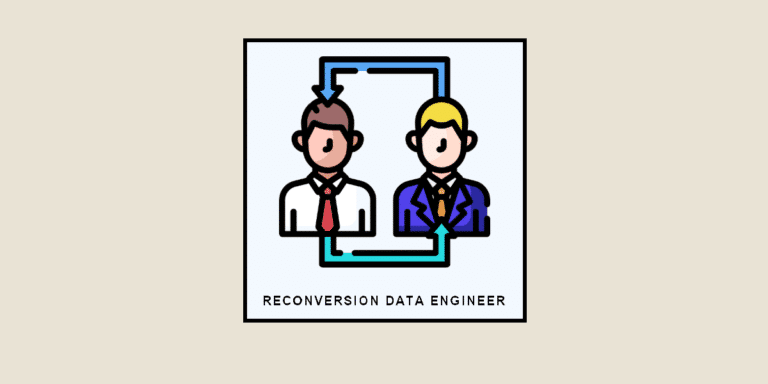Are you looking to move into a career with a bright future? Have you thought about the data professions? Discover the keys to a successful transition to Data Engineer, a promising career in high demand. Learn the essential steps for a successful transition to Data Engineer.
And yes, even though more and more solutions are being developed to simplify the task of data analysis, the data sector is still booming. Particularly in the processing phase. Hence the importance of data engineers within organisations. But it has to be said that companies are struggling to recruit due to a lack of skilled profiles. So if you’re looking for a new career, consider a career change to data engineer.
Why become a data engineer?
A job with a future
The data engineer is the data expert who sets up the architecture to facilitate the processing and analysis of large volumes of data. Responsible for managing a company’s data flows, they collect and make data available so that it can be easily exploited by data scientists and data analysts.
In a world where quality data is an increasingly precious resource, companies need these professionals more than ever. But it has to be said that there is a constant mismatch between supply and demand. The vast majority of companies are finding it difficult to recruit this profile, with a third of job vacancies going unfilled.
So if you’re looking for a job with a future, a career change to data engineer is an excellent option.
An attractive salary
Because of the attractiveness of the Big data engineer, juniors can expect a salary of €41,431. But that’s only for the first few years after you become a data engineer. The average salary for a data engineer is €50,000 a year, or €4,167 a month. And for the most experienced, the salary goes up to €70,000 a year.
That said, this is only an average. There can be wide variations depending on the sector of activity and geographical location.
Data engineers can also work for companies or on a freelance basis. In the latter case, their remuneration is even higher (around €617 per day).
Attractive career prospects
After retraining as a data engineer, it’s always possible to progress professionally. And yes, after several years’ experience, you could move into Sales Engineer roles if you’re keen on sales, Solution Engineer if you’re passionate about engineering, or even Manager of a team of Data Engineers if management appeals to you.
Whatever you decide to do, becoming a data engineer will give you the chance to move up to an even broader range of positions and to take on more responsibility as your career progresses.

How do you successfully convert to a data engineer?
Taking stock of your skills
Before starting a career change to become a data engineer, it’s best to know the level of skills required for the job. Since data engineering is a highly technical field, you will need to master a number of hard skills, such as :
- Programming languages such as Python and Java. You need to know how to code in order to design Big Data architectures that meet companies’ expectations.
- Cloud environments, such as Azure, Google Cloud Platform and AWS.
- Data storage, whether in the form of a data lake or data warehouse. In this respect, mastery of SQL and NoSQL databases is essential.
- Big Data processing, and in particular the Hadoop and Spark frameworks.
- The idea is to be able to handle huge volumes of data.
- Automation at all stages of the data lifecycle.
- ETL and ELT pipelines for data transformation.
Machine learning and data visualisation. Without being an expert, the data engineer must know the basics of data science and analytics.
Rest assured, all these technical skills can be acquired through specialised training. And that’s the key to a successful career change to data engineer.
Choosing your course
Data engineering is a complex field, so it’s essential to get some training before becoming a data engineer. To improve your skills, it’s best to follow a specialised training course. That’s exactly what we offer at DataScientest. You can follow our programme in the form of a Bootcamp spread over 13 weeks, or through a part-time apprenticeship over 9 months.
And to maximise the success of your transition to data engineer, don’t hesitate to take professional certifications (such as AWS certifications). This will increase your value to future employers.










